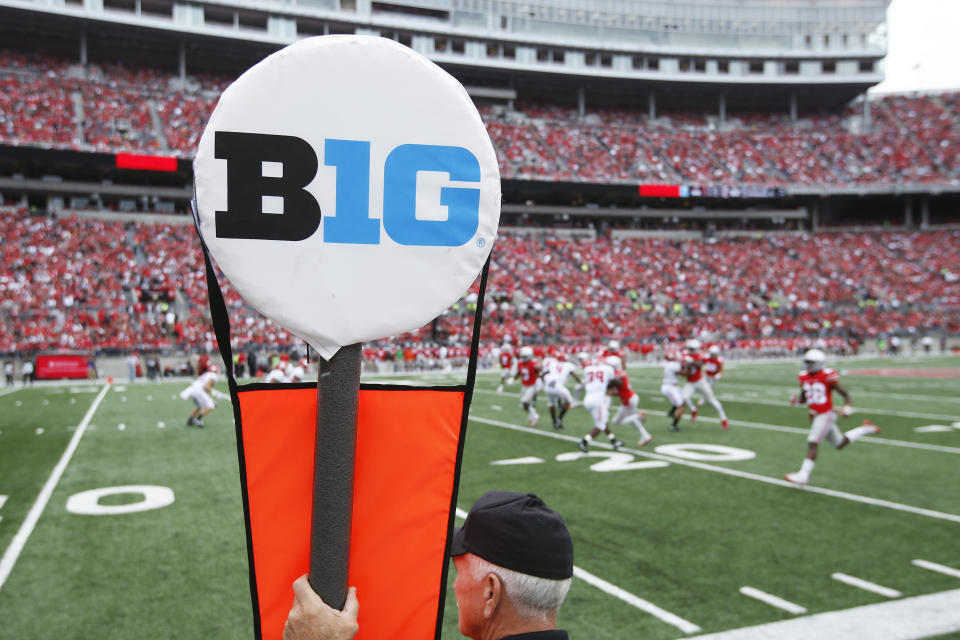If Big Ten pulls plug on college football season, other conferences don't have to follow suit
Every available tea leaf and off-the-record source in the Big Ten suggests the conference is on the verge of pulling the plug on fall sports, namely football. The teams can’t practice in full pads. Campus leaders keep having hastily called meetings. Athletic directors privately acknowledge they are staring into the abyss.
Nothing is official, but if the obvious becomes the inevitable then it is a massive blow to a way of life for tens of millions of fans, let alone the players, coaches and staff that engage in this uniquely and addictively wild American pursuit known as college football.
Worse, across college athletics the belief is that once one Power Five conference bails, the others will do the same.
“I think if one league shuts down, then the others will follow like dominoes,” an SEC athletic director theorized this week.
“I assume the ACC will be watching the SEC for football,” said one ACC athletic director on Sunday night. “We usually do.”
Funny. Yet probably true. One decision begets the next and just like that any semblance is gone of a college football season in 2020. It was already going to be abbreviated, unusual and without any guarantee of succeeding until the end, whatever that might have entailed.
In desperation, the college football world was willing to take it.
Maybe the military academies or an independent such as BYU scrapes some games together, but a season without Ohio State, Alabama, LSU and Clemson isn’t really a season.

Does it have to be this way?
Here’s the simplest plea to everyone: Pump the brakes and think this through.
If the Big Ten decides to end its season, that doesn’t mean there should be a race to be second.
What’s good for that league may not be for all the conferences. What needs to be done in Ohio may not be what needs to be done in Texas.
Yes, the Big Ten likes to carry itself with a sense of academic elitism, which can impact the thinking of the presidents and chancellors who run universities elsewhere. Ditto for the Pac-12, who may work in lockstep with the Big Ten. Stanford, UCLA and Cal can carry significant weight in academia.
Maybe, in the end, all the leaders, schools and conferences will conclude the same thing — this just wasn’t possible.
There should, though, be extensive consideration.
This shouldn’t be a game of follow the leader. Just because everyone in college sports expects one decision to force the hand of the next decision, it doesn’t have to be that way.
Can a season be done safely? Can a conference-only season work? It was always going to be tough, but is it impossible?
Can pseudo-bubbles be constructed to limit outbreaks and increase the likelihood of games being played by healthy and willing players?
Maybe. It’s ridiculous for a sportswriter to sway you one way or the other. These are massively complex and extremely expensive decisions. It’s still just football.
To push forward would require bold leadership, innovation and a refusal to accept the easy no — or basically exactly what all these schools claim to be about in those in-game television commercials. It would require the honesty to admit that these football players aren’t just “regular” students, a charade that has gone on too long and now might cost college sports billions … and a season.
Know this though: If anyone does it and does it safely, the potential for exposure, momentum and respect is enormous. The risk may be big. The reward could be as well.
Know this too: Each league and each school has spent considerable time and money setting up protocols for their situations, campuses and communities. Many have managed the summer with limited positive tests and lots of success at changing habits. And so many players and coaches have proven they are committed to doing whatever it takes.
If a school and a league thought this might work last week, then why change their minds because some presidents in the Midwest aren’t sure about their plans?
Maybe in the end everyone comes to the same conclusion. Maybe in the end this incredible task was too much to pull off.
That’s fine.
Just make that decision based on your own conclusions, your own studies, your own situation. Not what some other league is doing.
More from Yahoo Sports:

